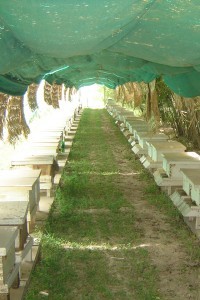
Ali Hussain Heremish knew the Iraqi buzz about honey. There was a huge demand for local honey and Iraqis paid a premium for imported honey.
Ali had a graduate degree in apiculture and had been raising bees for nearly 15 years. But he needed cash to launch a commercial apiary to take advantage of the domestic market for high-priced honey.
So he approached USAID’s Community Action Program (CAP III) for a grant to help him establish a beekeeping business. CAP III helps communities define their needs and mobilize resources to solve problems.
Ali presented a detailed business proposal to produce high-quality honey and honeycomb for sale in local markets. But rather than focus solely on honey sales, he had the innovative idea of expanding his bee colony and selling the excess bee cells for a profit.
With support from the of the U.S. Agency for International Development’s CAP III program, Ali purchased 100 empty cells, natural wax, jars for honey, honey extractors and other materials he needed to launch his business.
He built canopies to protect the bee cells from the harsh sun and started his apiary with 200 full bee cells, each containing 2,000 bees.
The colony quickly grew and Ali was able to fill the empty cells he had purchased with bees, which he then sold for a profit.
Even with his bee cell sales, Ali now has more than 350 active cells. The increased capacity has allowed him to hire and train seven full-time beekeepers, providing jobs to the community and high-quality products at reasonable prices.
The beekeeping business has benefited both the community and Ali, whose income has risen substantially from the sale of honey and other commercial beekeeping products.







Comment
Make a general inquiry or suggest an improvement.